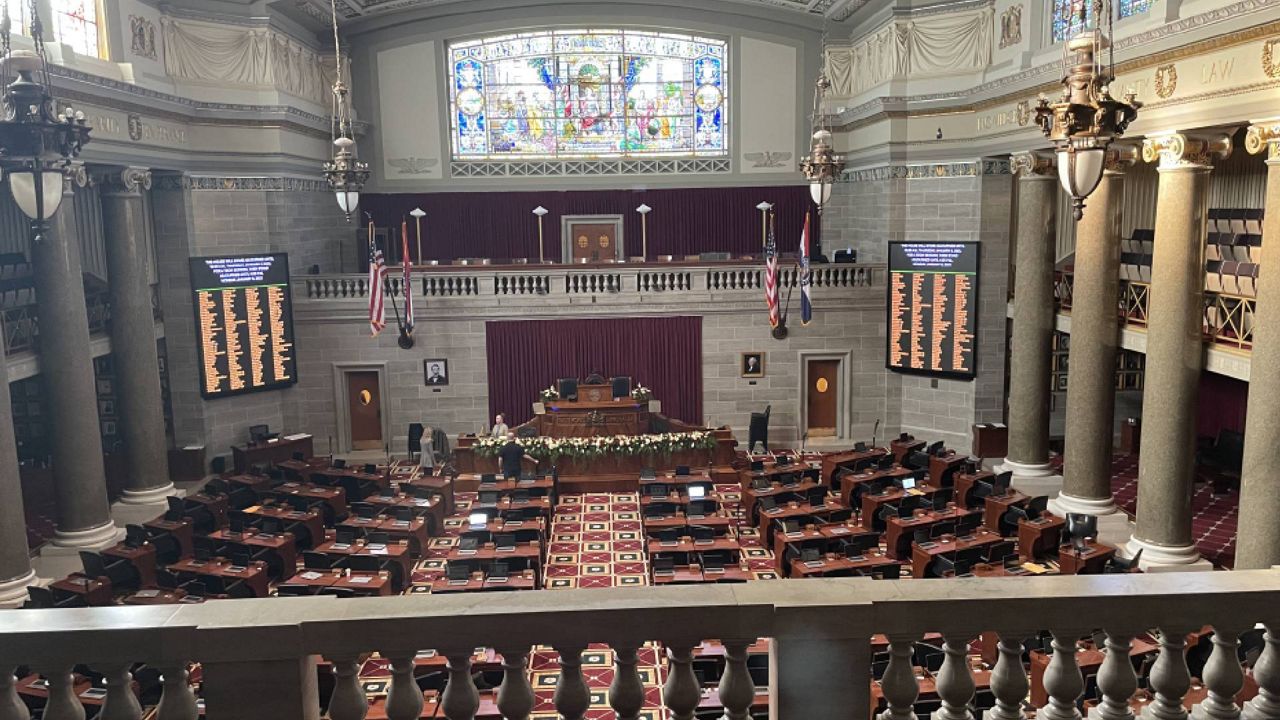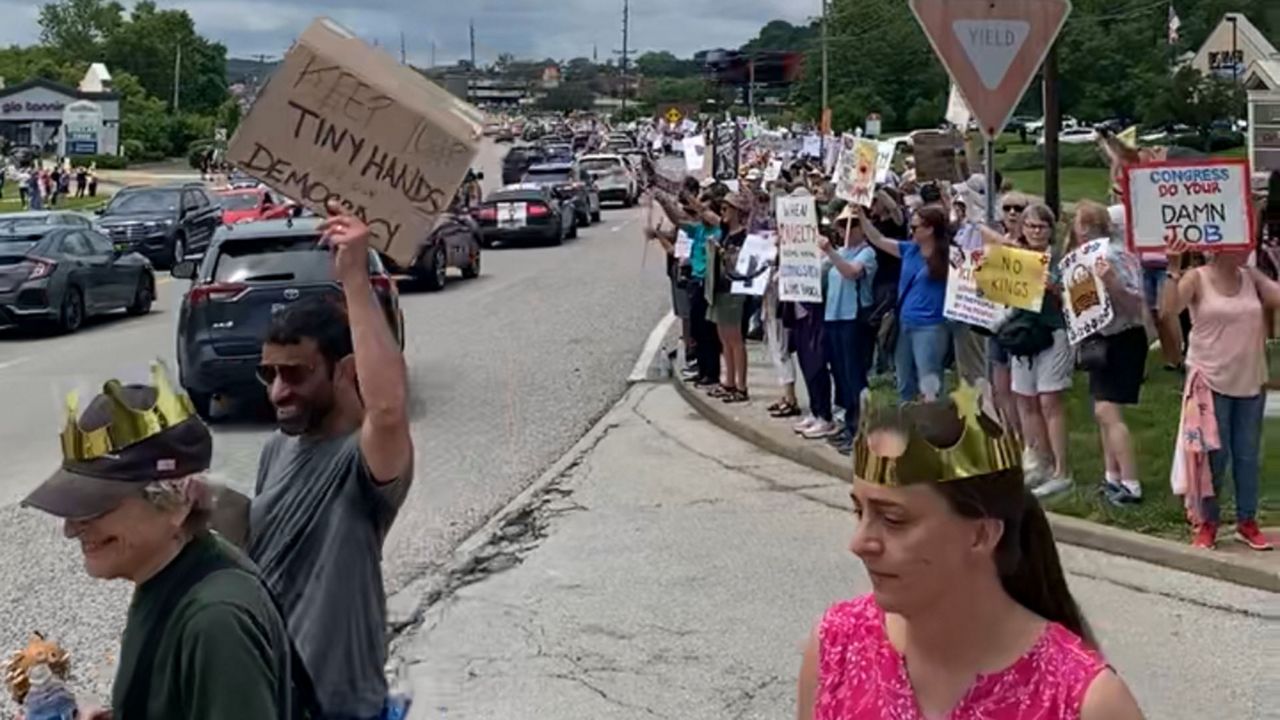ST. LOUIS–Missouri lawmakers are just over one week into the 2023 session of the General Assembly, and except for a heated floor debate over dress code rules for female House members, the process of getting up and running in Jefferson City has been much smoother than what the public has seen in Washington, DC. Still, real legislative activity has yet to truly materialize as committees get formed and new members just sworn in get settled.
The pace will pick up next week when Gov. Mike Parson delivers his State of the State Address Wednesday afternoon.
One of the priorities sure to come up in that address, and during the remainder of the session is public safety. Bills have already been filed to address truth in sentencing, gun violence, police department staffing, and proposals that would target prosecuting violent crime, particularly in the city of St. Louis.
New House Speaker Dean Plocher, R-Des Peres told members in his first speech last week that “it must be a priority of this body to provide the resources and enact common sense reforms to protect every Missouri community,” although he hasn’t cited specific legislation.
“I care deeply about every Missourian who has been a victim of violent crime. I understand why they’ve lost trust in a dysfunctional local government where some officials even refuse to prosecute violent offenders. I sympathize with these families and have seen the streets become less and less safe as crime is enveloping their communities,” Plocher said from the dais on Jan 4. Without mentioning St. Louis by name, it repeated a criticism voiced by Republicans and police union officials in recent years–that St. Louis Circuit Attorney Kim Gardner fails to prosecute cases.
Lawmakers have introduced several bills which would give the Attorney General’s office concurrent jurisdiction in local circuit courts. Law enforcement agencies could petition a court to allow them to present charges to the Attorney General’s office instead of a local prosecutor.
Another proposal, part of a larger omnibus public safety bill, would let the governor name a special prosecutor for the city of St. Louis, if “the governor determines that a threat to public safety and health exists.” The bill was introduced by State Rep. Lane Roberts, R-Joplin, a former police chief and the chair of the House Crime Prevention and Public Safety committee.
Annie Gibson, Gallatin County Prosecutor and president of the Missouri Association of Prosecuting Attorneys said her organization has opposed concurrent jurisdiction for decades.
“The local prosecutor and the Missouri Attorney General play different roles in the criminal justice system. That system works —and works well —when the local prosecutor, elected by the voters in the jurisdiction, has original jurisdiction over cases, and the Attorney General handles cases on appeal and otherwise assists when asked by a local prosecutor,” she said.
“Giving the Missouri attorney general standing to prosecute (Class) A Felony cases and any felony sexual assault case in every judicial circuit in the state has the dangerous potential of undermining public trust in criminal justice at a time when many of us are working hard to rebuild that trust -- or, indeed, to establish it for the first time in some communities,” St. Louis County Prosecuting Attorney Wesley Bell said. “This would be contrary to democracy, criminal justice, and any fragile public trust in criminal justice.”
Representatives for Gardner were still working on a possible response to the bills when asked for a reaction. Attorney General Andrew Bailey’s office declined comment on legislative proposals.
Local or State Control of Police?
A decade after Missouri voters returned control of the St. Louis Metropolitan Police Department to City Hall from a state board of commissioners, lawmakers have introduced several measures which would reverse course.
One author, State Rep. Justin Sparks, R-Wildwood, just left his post as a St. Louis County Police Officer after winning election in November. Sparks cites a lack of manpower, training and equipment problems as factors behind an exodus of SLMPD officers over the last five years. He also points to the fact that city leaders have said the city doesn’t need more officers, filling vacant positions with social service staffers who have worked to divert cases from law enforcement.
The St. Louis Police Officers Association supports the switch, with the organization’s business manager telling KMOX radio that local control has been “a failed experiment.”
The board of the Ethical Society of Police, which largely represents minority members of SLMPD, said it “is actively monitoring the bills involving State Control this legislative session and even providing input for one bill in development. This is an important issue for SLMPD.” A 2020 ESOP report on the department noted that the organization opposed the move to local control and claimed at the time that “minority officers have lagged behind with hiring, promotion, job placement in coveted positions, and more.”
University of Missouri-St. Louis criminologist Richard Rosenfeld called the idea of state control “a terrible idea,” and said lawmakers haven’t laid out specifics for how such a move would address fighting crime.
“What it would do in the city is generate absolute incredible ill will. I think in large part that effort, legislative effort is borne out of concerns on the part of many legislators who simply don’t like the current mayor in the city, and right now would be absolutely the worst time to change the governing structure,” Rosenfeld said, considering the city just hired a new police chief in Robert Tracy, who hasn’t had a chance to see what he can do in the job yet. Local control of the police department, he added, would do nothing to address concerns over the Circuit Attorney’s office.
In a Thursday morning interview on KMOX, Tracy said the success he had with the Wilmington (Del.) police staved off similar efforts to have outside agencies assume control of that department. “That’s where we’re gonna be in St. Louis,” Tracy said.
Gun bills
Democrats, who are in the super-minority in both chambers, have introduced bills that they say would have prevented the fatal school shooting in St. Louis in October that killed a teacher and a student. There are bills that would make it illegal for teenagers to purchase or sell an automatic or semi-automatic weapon, bills establishing a “red flag” law that would allow police to more easily go to court to have weapons temporarily removed from someone’s custody with a court order, and a constitutional amendment to require a background check on all gun transfers.
“I would hope that when children die in our public schools that it would change the tone of the conversation,” Rep. Crystal Quade, D-Springfield and Minority Floor Leader said last week. “I don’t know that it will, but I can promise you that our caucus is going to continue to work with law enforcement to hear what they need to do their jobs successfully and do our best to support them in that effort.”
“We see the gun amendments year in year out. It’s always just been there. The voters have supported our second amendment stance, so I see a strong second amendment support continuing,” Plocher said.
“It’s a matter of identifying things that are possible and moving things in the right direction,” State Senate President Pro Tem Caleb Rowden R-Boone County said when asked about crime legislation on This Week in Missouri Politics in an interview posted Sunday. “It’s probably not gun-related, but there are other things that are possible that I do think will help curb crime in areas all across the state.”
Missouri Chamber of Commerce impact
The Missouri Chamber of Commerce and Industry signaled after last year’s regular session that it would get involved this year lobbying on crime and public safety measures after polling of CEOs showed crime was impacting the state’s economy. Chamber leaders highlighted the need to hire more officers, increase funding for police technology, address substance abuse and mental health problems, and reduce recidivism.
Legislatively, that has translated this year into support for the Roberts omnibus bill that includes the special prosecutor provision. The Chamber’s top lobbyist said the organization could also back the bills on concurrent jurisdiction.
“These are all a starting point that’s gonna get refined through the process, but yeah the concurrent jurisdiction is something that we’re looking at and I think is something that we likely would support,” said Kara Corches, the Missouri Chamber’s VP of Governmental Affairs. “We’re not necessarily carving out the pathway. Our end result is to ensure again that these violent criminals are being prosecuted and so there’s probably various ways to see more of that and obviously it’s going to evolve throughout the process this year from January to May in the Capitol.”
Other Chamber-backed legislation would help offenders leaving prison get jobs by making sure they have a birth certificate and an ID from the Department of Corrections. On the law enforcement side, there are bills to reimburse officers for their training academy tuition and to create an income tax reduction for any state trooper, law enforcement officer or peace officer as a way to combat recruitment efforts to lure officers out of state.
Second Amendment Preservation Act
Chamber officials said last summer they supported the idea of reforming the Second Amendment Preservation Act, or SAPA, a 2021 bill which effectively nullifies federal gun laws in the state. Law enforcement agencies have stopped cooperating with federal partners in some instances over risks of being held liable in court if someone claims a violation of second amendment rights. The city of St. Louis, St. Louis County and the Justice Department are still challenging the law in state and federal courts.
MAPA’s Gibson said in its current form the law “has made Missouri less safe,” and “severely undermines law enforcement’s ability to prosecute dangerous criminals who use weapons when they prey on innocent citizens.”
SAPA reform does not appear as part of the Chamber’s published legislative agenda for this session. Support would have been notable, given the organization's traditional backing of Republican candidates.
State Rep. Peter Merideth, D-St. Louis, introduced legislation that would repeal parts of the law, but could find it difficult to make it to a committee hearing without GOP support.








